A simple yes-or-no question keeps tripping up Senate Republicans: Should the president ask foreign countries to investigate political rivals?
A month ago the question was a legal and constitutional no-brainer. It's illegal to accept foreign help in a political campaign, an action that also raises questions about U.S. sovereignty. But President Donald Trump last week forcefully defended his right to do so as he publicly called on both China and Ukraine to investigate former Vice President Joe Biden and Biden's son, Hunter. A private request for Ukraine to launch a probe triggered an impeachment inquiry in the Democratic-controlled House of Representatives.
On Thursday, two Republican senators — Joni Ernst of Iowa and Cory Gardner of Colorado — repeatedly refused to answer reporters' questions on whether a president should make such a request of a rival power. "I don't know that we have that information in front of us," Ernst said in Iowa, even though the president made the request in front of cameras on the White House lawn.

FILE - In this March 13, 2019 file photo, reporters pose questions to Sen. Cory Gardner, R-Colo., on his way to a vote at the Capitol in Washington. (AP PhotoJ. Scott Applewhite)
In Denver, Gardner likewise wouldn't answer reporters' variations on the question 12 separate times before an appearance with the Colorado Chamber of Commerce. Like Ernst, he tried to punt to the Senate Intelligence Committee, which is investigating the circumstances around Trump's private call with Ukraine. "It's an answer that you get from a very serious investigation," Gardner told reporters when asked about the appropriateness of the president's public comments.
The hesitance of the two senators, who are both up for reelection next year in competitive states, contrasted with the stances of two Republicans not facing the voters anytime soon. On Wednesday, Sen. Lamar Alexander of Tennessee, who is retiring next year, said in a statement that it was "inappropriate" for Trump to make his request. But, Alexander added, impeachment would be a "mistake."
Sen. Rob Portman of Ohio, who was easily reelected in 2016, told reporters on Tuesday that Trump's request was "wrong" but argued it isn't an impeachable offense.
Ari Fleischer, a former spokesman for President George W. Bush, who has often defended Trump, tweeted Thursday: "Trump doesn't hide what he does. But it's still wrong for Presidents and candidates to ask foreign governments to get involved in our elections."
In contrast, Ernst and Gardner seemed to follow a pattern set by fellow Republican Arizona Sen. Martha McSally — also a top Democratic target next year. On Monday, McSally also wouldn't answer whether the president can ask for overseas help, instead referring to the Senate Intelligence Committee probe and taking swipes at House Democrats.
Ernst and Gardner also tried to turn the question into an attack on the other party. After House Speaker Nancy Pelosi tweeted a video of Ernst refusing to answer questions about a president's overseas call for political help, Ernst tweeted back: "Actually, American elections should be decided by ELECTIONS. Not politicians. I know you're still upset about the results from 2016, but people here in Iowa would sure appreciate it if you spent less time playing political games and actually brought #USMCAnow up for a vote." USMCA is the acronym of a new version of the North American Free Trade Agreement.
In Denver, Gardner also tried to turn his awkward situation into an opportunity to attack Pelosi and Democrats. He contended that Democrats were looking for an excuse to remove Trump from office.
"This is about the politics of the moment and that's why they're trying to do this now," Gardner said.
The Colorado senator's repeated dodging of the question may have made for awkward television, but it seemed to make one important viewer happy. Trump liked a tweet from a reporter describing Gardner's refusal to discuss the appropriateness of the president's requests.
Jonathan J. Cooper in Phoenix contributed to this report.
KYIV, Ukraine (AP) — A big, new package of U.S. military aid will help Ukraine avoid defeat in its war with Russia. Winning will still be a long slog.
The arms and ammunition in the $61 billion military aid package should enable Ukraine to slow the Russian army's bloody advances and block its strikes on troops and civilians. And it will buy Ukraine time — for long-term planning about how to take back the fifth of the country now under Russian control.
“Ultimately it offers Ukraine the prospect of staying in the war this year,” said Michael Clarke, visiting professor in war studies at King’s College London. “Sometimes in warfare you’ve just got to stay in it. You’ve just got to avoid being rolled over.”
The U.S. House of Representatives approved the package on Saturday after months of delays by some Republicans wary of U.S. involvement overseas. It was passed by the Senate on Tuesday, and President Joe Biden said he would sign it Wednesday.
The difference could be felt within days on the front line in eastern and southern Ukraine, where Russia’s much larger army has been slowly taking territory against massively outgunned Ukrainian forces.
The aid approval means Ukraine may be able to release artillery ammunition from dwindling stocks that it has been rationing. More equipment will come soon from American stocks in Poland and Germany, and later from the U.S.
The first shipments are expected to arrive by the beginning of next week, said Davyd Arakhamia, a lawmaker with Ukrainian President Volodymyr Zelenskyy’s Servant of the People party.
But opposition lawmaker Vadym Ivchenko, a member of the Ukrainian parliament’s National Security, Defense and Intelligence Committee, said logistical challenges and bureaucracy could delay shipments to Ukraine by two to three months, and it would be even longer before they reach the front line.
While details of the shipments are classified, Ukraine’s most urgent needs are artillery shells to stop Russian troops from advancing, and anti-aircraft missiles to protect people and infrastructure from missiles, drones and bombs.
What’s coming first is not always what front-line commanders need most, said Arakhamia, the Ukrainian lawmaker. He said that even a military giant like the U.S. does not have stockpiles of everything.
“The logic behind this first package was, you (the U.S.) finds our top priorities and then you see what you have in the warehouses,” Arakhamia said. “And sometimes they do not match.”
Hope for future breakthroughs for Ukraine still hangs on more timely deliveries of Western aid, lawmakers acknowledge.
Many experts believe that both Ukraine and Russia are exhausted by two years of war and won’t be able to mount a major offensive — one capable of making big strategic gains — until next year.
Still, Russia is pushing forward at several points along the 1,000-kilometer (600-mile) front, using tanks, wave after wave of infantry troops and satellite-guided gliding bombs to pummel Ukrainian forces. Russia is also hitting power plants and pounding Ukraine’s second-largest city, Kharkiv, which is only about 30 kilometers (some 20 miles) from the Russian border.
Ivchenko said the goal for Ukraine’s forces now is to “hold the line” until the bulk of new supplies arrive by mid-summer. Then, they can focus on trying to recapture territory recently lost in the Donetsk region.
“And probably ... at the end of summer we’ll see some movement, offensive movement of the Ukrainian armed forces,” he said.
Some military experts doubt Ukraine has the resources to mount even small offensives very soon.
The U.S. funding “can probably only help stabilize the Ukrainian position for this year and begin preparations for operations in 2025,” said Matthew Savill, director of military sciences at the Royal United Services Institute, a think tank.
In the best-case scenario for Ukraine, the American aid will give commanders time to reorganize and train its army — applying lessons learned from its failed summer 2023 offensive. It may also galvanize Ukraine’s allies in Europe to increase aid.
“So this just wasn’t about Ukraine and the United States, this really affected our entire 51-country coalition,” said U.S. Congressman Bill Keating, a Democrat who visited Kyiv on Monday as part of a four-member congressional delegation.
Zelenskyy insists Ukraine's war aim is to recapture all its territory from Russia — including Crimea, seized illegally in 2014. Even if the war ultimately ends through negotiation, as many experts believe, Ukraine wants to do that from as strong a position as possible.
Whatever happens on the battlefield, Ukraine still faces variables beyond its control.
Former U.S. President Donald Trump, who seeks to retake the White House in the November election, has said he would end the war within days of taking office. And the 27-nation Europe Union includes leaders like Hungarian President Viktor Orbán and Slovakian Prime Minister Richard Fico, who have opposed arming Ukraine.
Ukraine’s allies have held back from supplying some arms out of concern about escalation or depleting their own stocks. Ukraine says that to win the war it needs longer-range missiles it could use for potentially game-changing operations such as cutting off occupied Crimea, where's Russia's Black Sea fleet is based.
It wants Army Tactical Missile Systems, known as ATACMs, from the U.S. and Taurus cruise missiles from Germany. Both governments have resisted calls to send them because they are capable of striking targets deep within Russian territory.
The new bill authorizes the president to send Ukraine ATACMS “as soon as practicable.” It's unclear what that will mean in practice.
Sometimes, promised weapons have arrived late, or not at all. Zelenskyy recently pointed out that Ukraine is still waiting for the F-16 fighter jets it was promised a year ago.
Meanwhile, Russia is using its advantage in troops and weapons to push back Ukrainian forces, perhaps seeking to make maximum gains before Ukraine's new supplies arrive.
For weeks it has pummeled the small eastern city of Chasiv Yar, at the cost of 900 soldiers killed and wounded a day, according to the U.K. Ministry of Defense.
Capturing the strategically important hill town would allow them to move toward Sloviansk and Kramatorsk, key cities Ukraine controls in the eastern region of Donetsk. It would be a significant win for Russian President Vladimir Putin, who Western officials say is bent on toppling Ukraine’s pro-Western government.
Russian pressure was aimed not just at gaining territory, but on undermining Zelenskyy and bolstering critics who say his war plan is failing, said Clarke of King's College London.
The U.S. aid package decreases the likelihood of a political crisis in Ukraine, and U.S. Speaker Mike Johnson deserves credit for pushing it through Congress, he said.
"He held history in his hands,” Clarke said.
Follow AP’s coverage of the war in Ukraine at https://apnews.com/hub/russia-ukraine
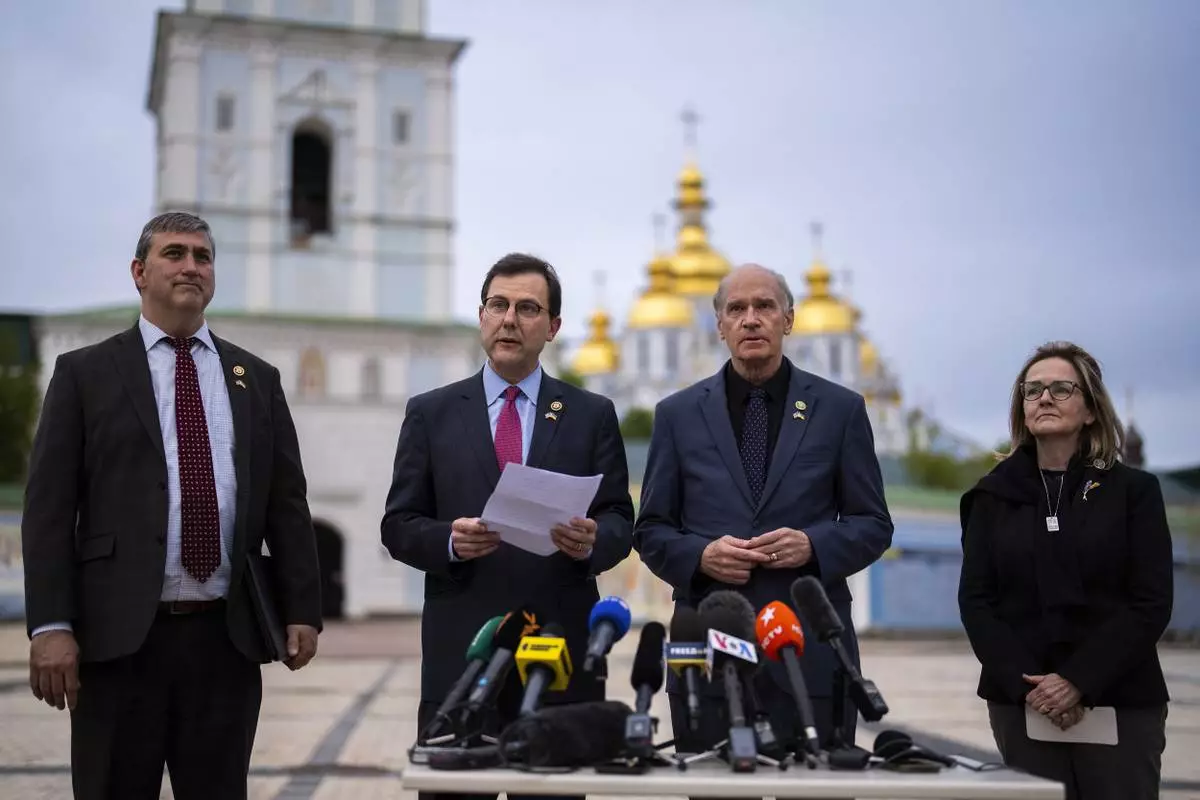
From left, U.S. representatives Nathaniel Moran, R-Tx, Tom Kean Jr, R-NJ, Bill Keating, D-Mass, and Madeleine Deane, D-Pa, talk to journalists during a joint news conference outside Saint Michael cathedral in Kyiv, Ukraine, Monday, April 22, 2024. A newly approved package of $61 billion in U.S. aid may prevent Ukraine from losing its war against Russia. But winning it will be a long slog. (AP Photo/Francisco Seco)
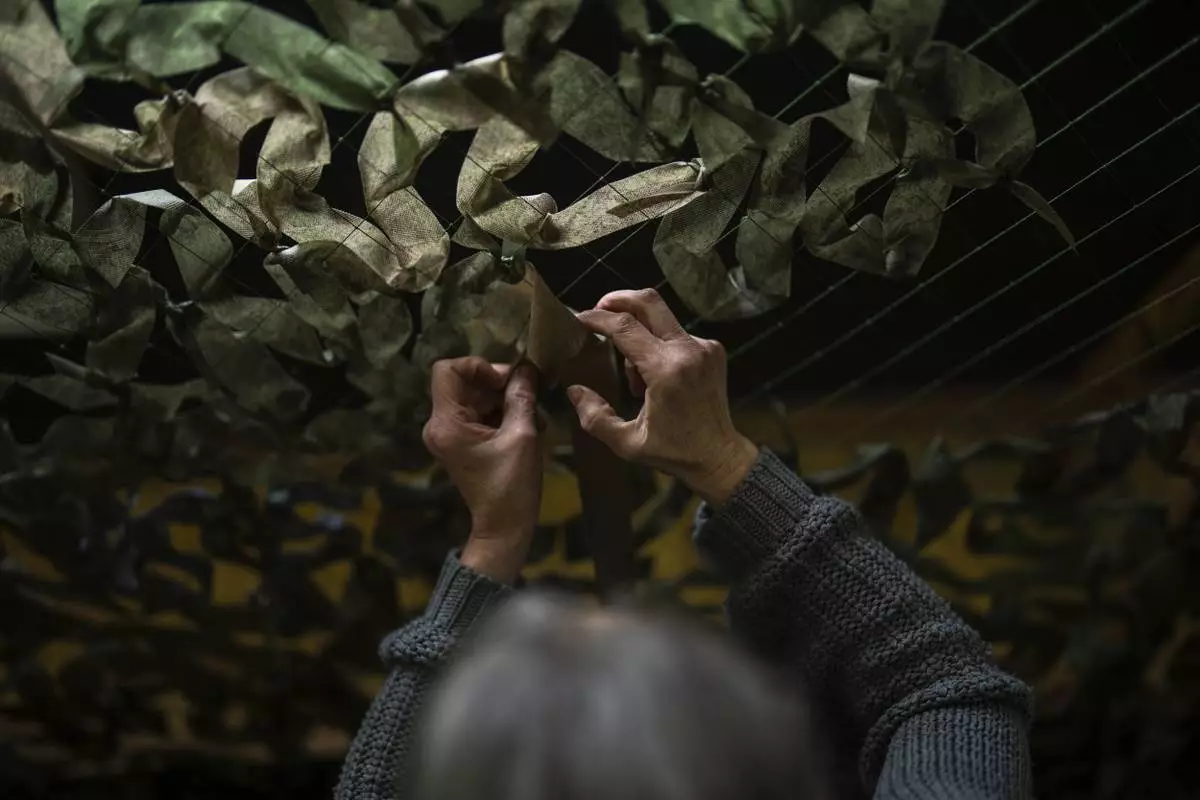
A volunteer makes a camouflage net at a facility producing material for Ukrainian soldiers in Kyiv, Ukraine, Monday, April 22, 2024. A newly approved package of $61 billion in U.S. aid may prevent Ukraine from losing its war against Russia. But winning it will be a long slog. (AP Photo/Francisco Seco)
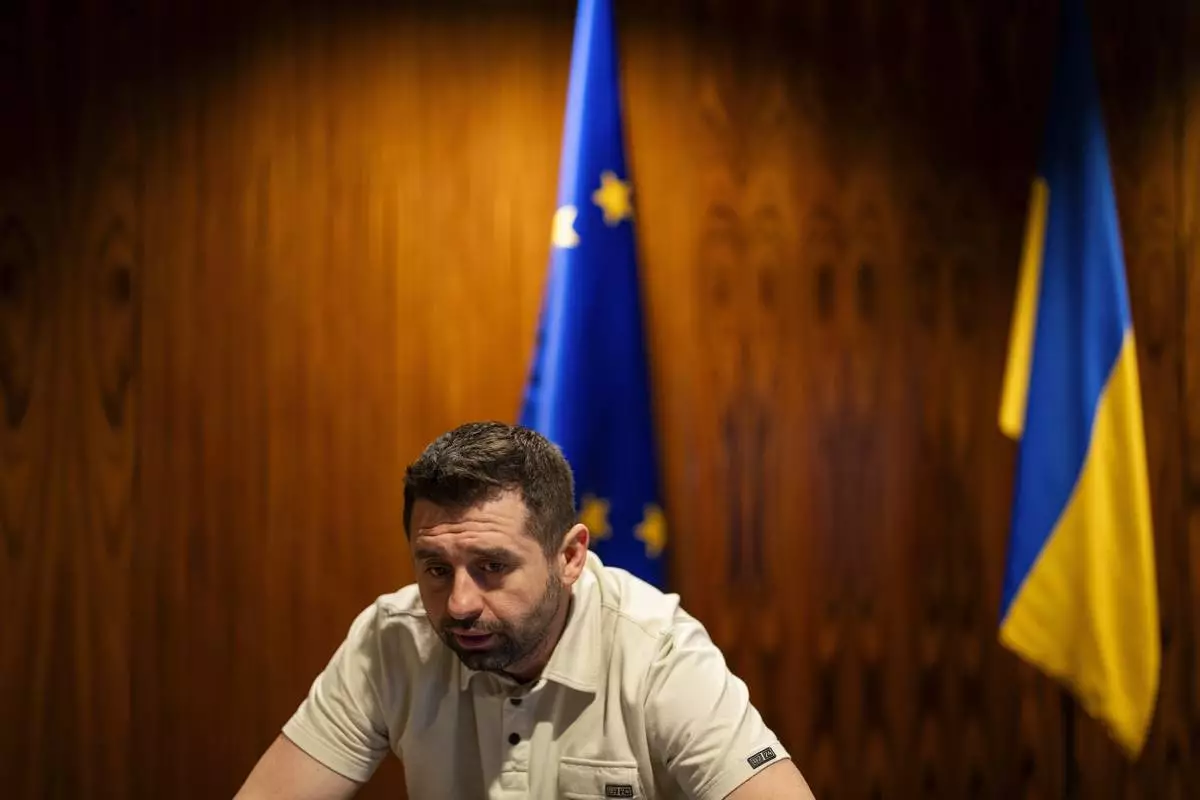
Davyd Arakhamia, a lawmaker with Ukrainian President Volodymyr Zelenskyy's Servant of the People party, talks during an interview with Associated Press in Kyiv, Ukraine, Monday, April 22, 2024. (AP Photo/Francisco Seco)

A woman rallies to raise awareness on the fate of Ukrainian prisoners of war in Kyiv, Ukraine, Sunday, April 21, 2024. (AP Photo/Francisco Seco)
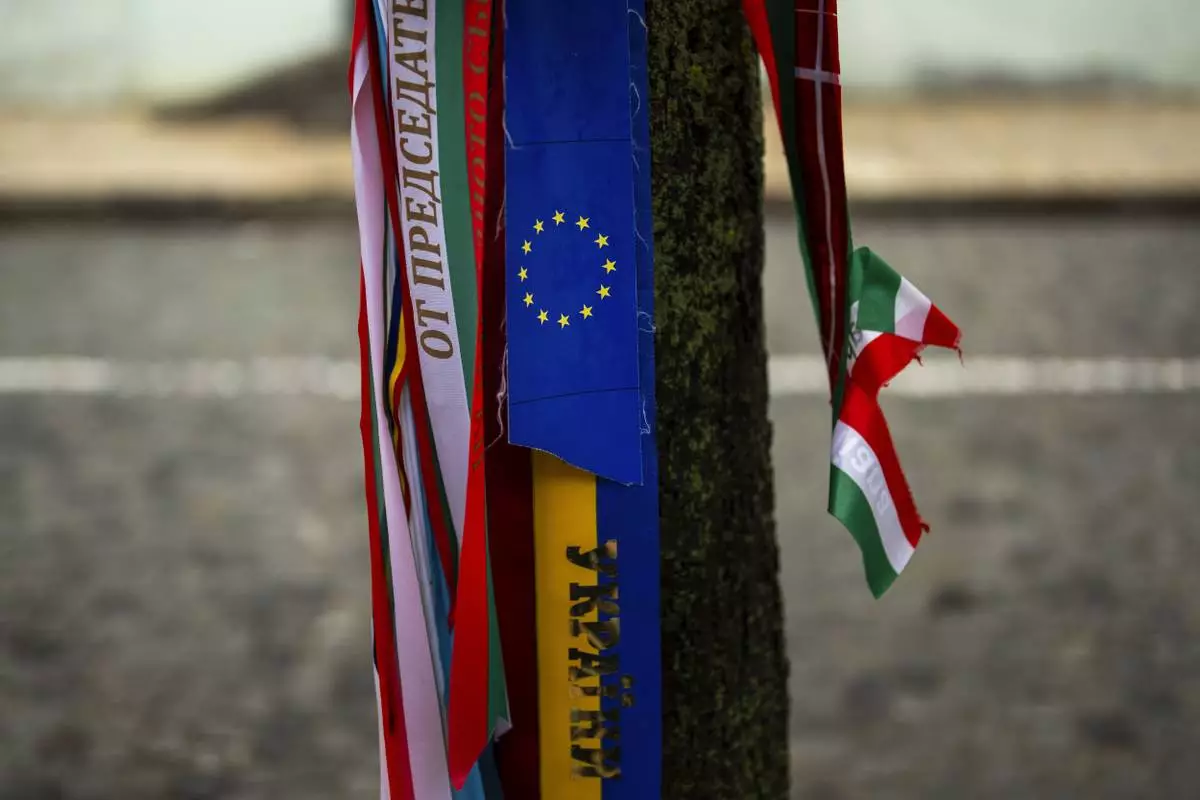
Ribbons with the colors of the European Union and Ukraine are attached to a tree next to memorial wall of Ukrainian soldiers killed during the war in Kyiv, Ukraine, Monday, April 22, 2024. (AP Photo/Francisco Seco)
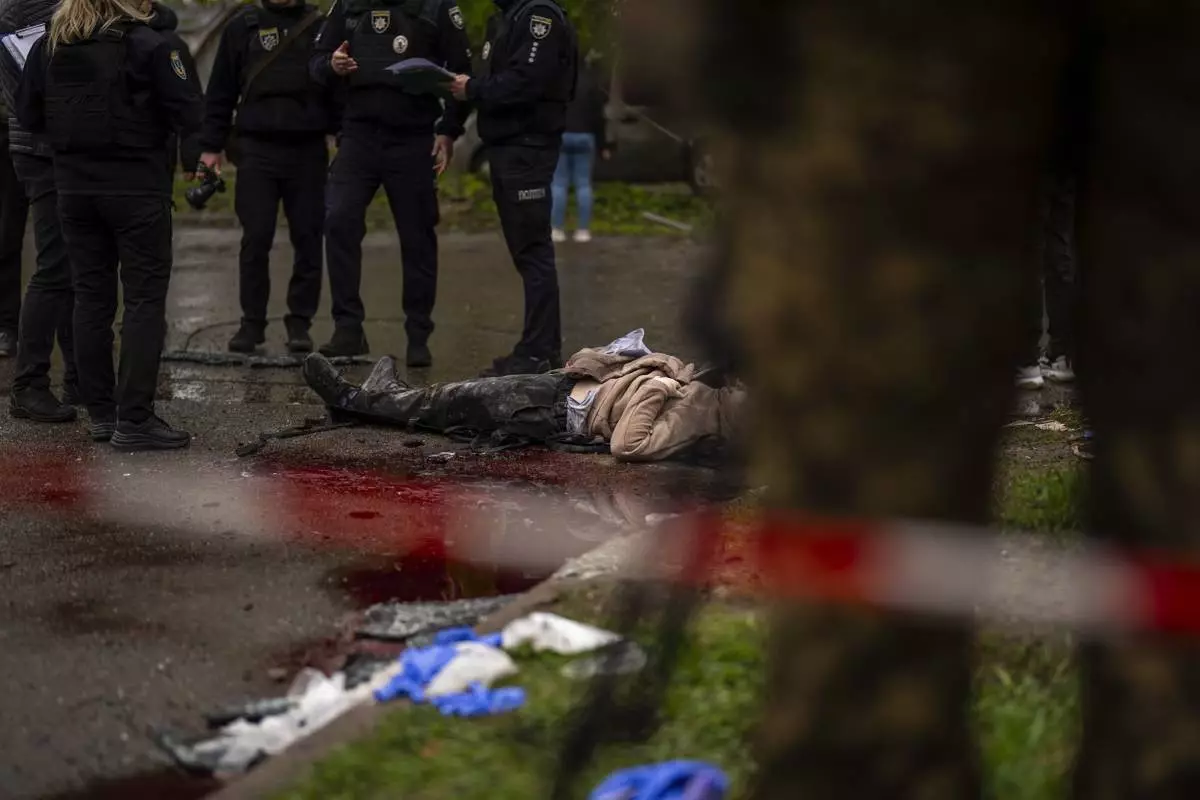
The body of a woman killed by Russian bombardment in Chernihiv, Ukraine, Wednesday, April 17, 2024. (AP Photo/Francisco Seco)

Soldiers carry the coffins of two Ukrainian army sergeants during their funeral in Lviv, Ukraine, Tuesday, April 16, 2024. (AP Photo/Francisco Seco)

















